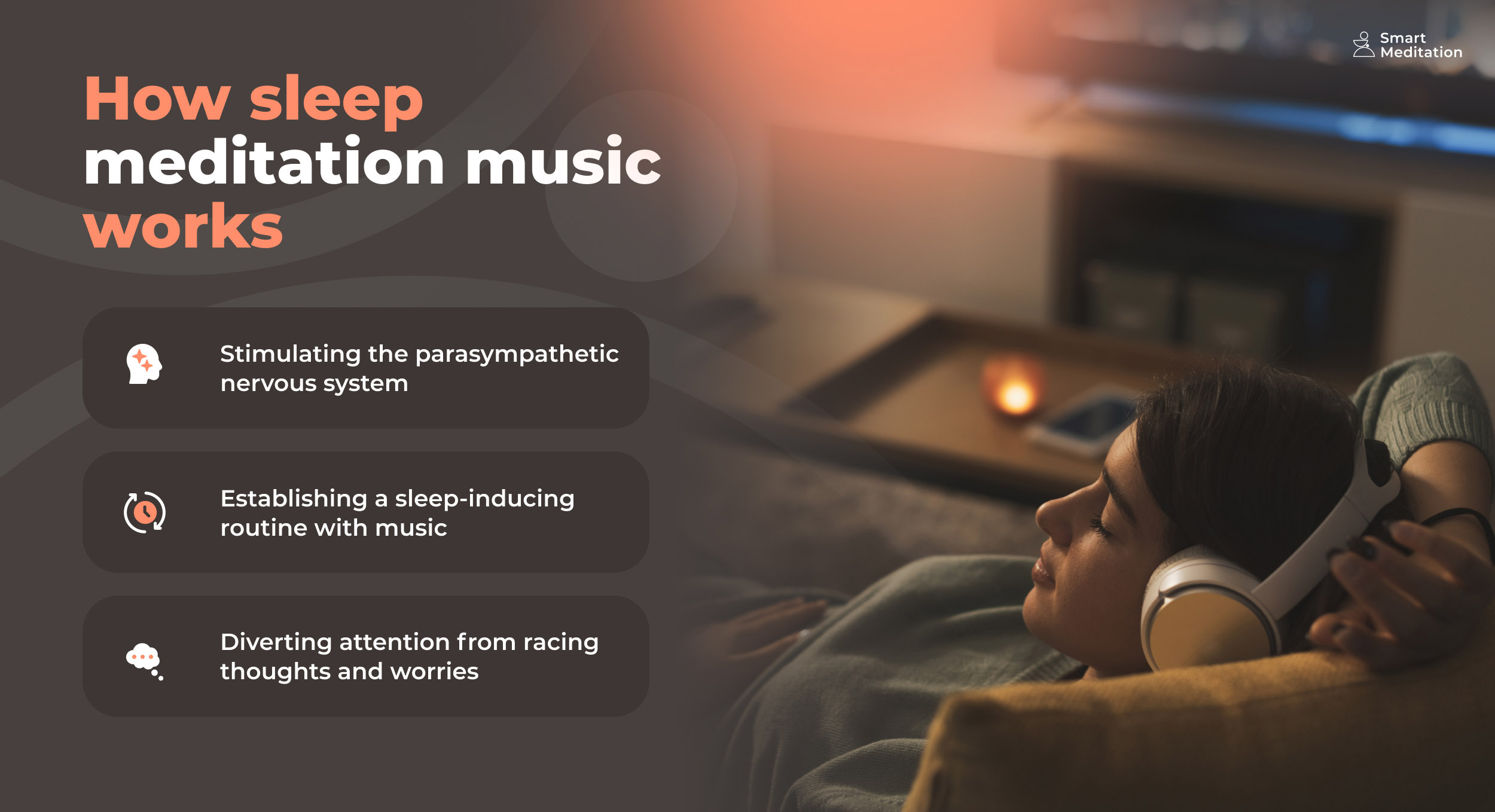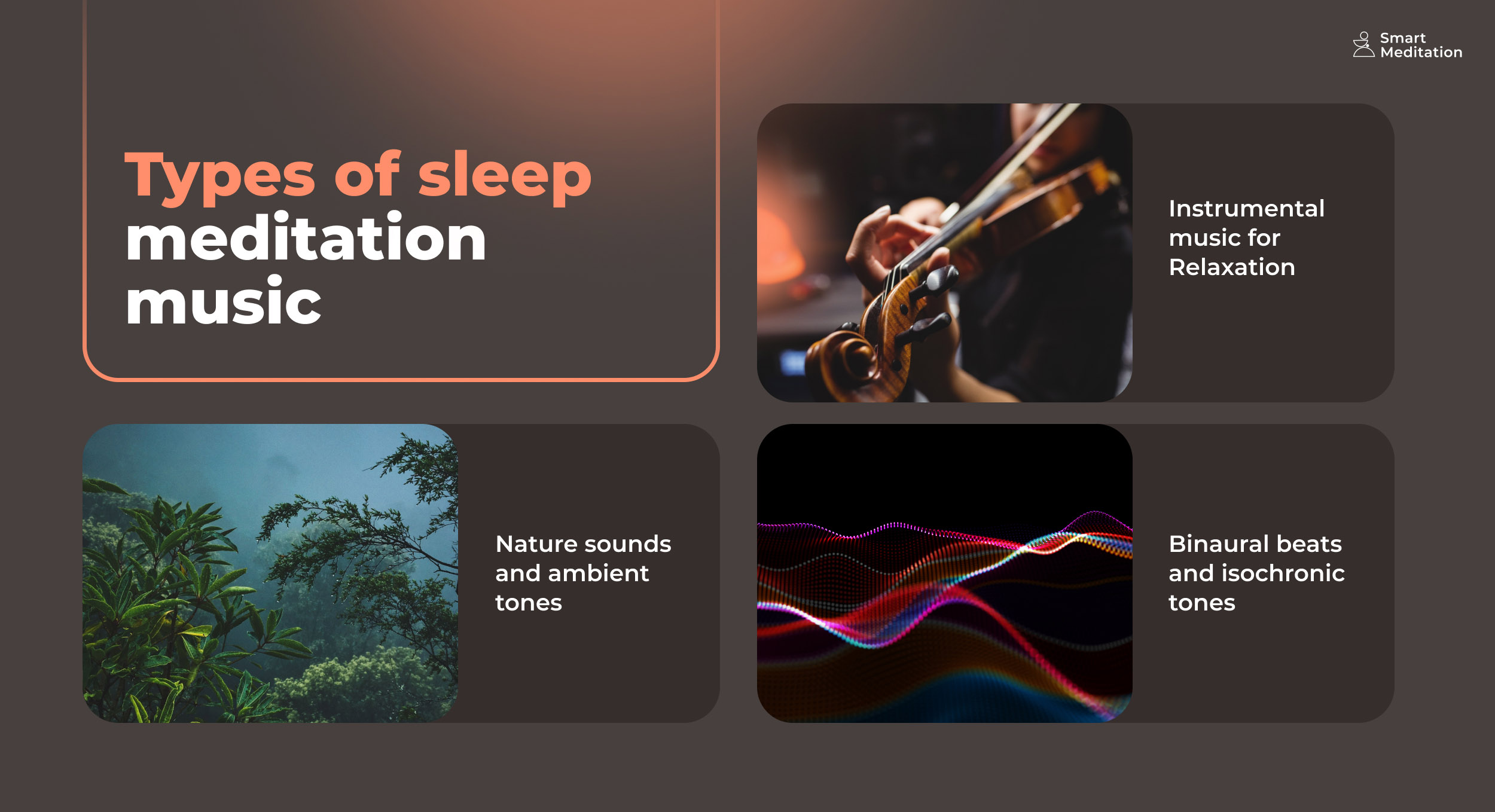
Sleep Meditation Music: Unveiling the Soothing Symphony of Slumber
Sleep and noise don’t usually go well together – unless it’s the right kind and the right amount of noise. Sleep meditation music can be a powerful tool at your disposal to bring the quality of your rest to the next level.
We’ve already discussed how meditation practices can enrich your sleep, and in this article we’ll be focusing on the audio aspect of the practice. Keep reading for interesting facts about music for sleep meditation, the science behind it, its benefits, types and how you should try to integrate it into your bedtime routine.
Understanding Sleep Meditation Music
Although the name of the term should speak for itself, let’s clear out all the possible gray areas and explain what sleep meditation music is and what makes it special.
What is sleep meditation music?
Sleep meditation music is usually understood as any relaxing melody that accompanies you as you’re falling asleep. These melodies are usually expertly designed to calm your thoughts and lull you into a sound sleep – which also tends to be more reinvigorating than normal sleep.
Technically speaking, music for sleep meditation is a synthesis of serene melodies, mellow rhythms, and harmonic tones. Some people believe that this type of music is more of a myth or a placebo than an actual part of sleep therapy – however, most research says otherwise. Meditation music for sleeping synchronizes with your brainwaves and reduces your stress levels as well as positively affects a number of other vitals, which we are going to talk about in the next section.
The science behind its effectiveness in promoting sleep
In a nutshell, according to studies, the frequencies and rhythms of sleep meditation music may positively affect how our brain functions. The slow, repetitive tones that are frequently used for this type of music is believed to support the brain’s natural transition to sleep and help drop blood pressure, slow heart rate, and quiet the nervous system, providing our body with the very much needed relaxation before we doze off.
How sleep meditation music differs from regular music or white noise
The biggest difference between meditation music for sleep and normal music or white noise lies in the function. While your favorite songs can evoke certain feelings or memories, the main goal of meditation sleep music is not to create associations, but to simply calm your mind. At the same time, white noise is usually used to block out outside noises, and it doesn’t share the same relaxing properties of sleep meditation music to put your head in the right frame of mind for sleep.
The Science Behind Sleep Meditation Music
Beyond its calming melodies, the appeal of meditation music for sleep ;also lies in its scientific foundation – a harmonic interplay between sound and sleep that has drawn the interest of academics, sleep experts, and psychologists alike.
For instance, according to a 2020 research in the journal Frontiers in Psychology, listening to relaxing music before bedtime dramatically improved participants’ quality of sleep and decreased their symptoms of insomnia. Another research, published in the National Library of Medicine in 2013, found that relaxing music aided older persons in falling asleep more quickly and getting more restorative sleep.
But what is the key to the effectiveness of sleep meditation music? It is in how it affects sleep cycles – the stages of sleep that the brain goes through when sleeping. Those include light sleep, deep sleep, and rapid eye movement sleep, or REM for short. According to studies, some genres of music, such as the slow-tempo and rhythmic songs, synchronize with brainwave rhythms that our mind associates with relaxing and inducing sleep.
How Sleep Meditation Music Works
Now, let’s dive deeper into the technical details and find out how exactly sleep meditation music helps our nightly rest.

Stimulating the parasympathetic nervous system
Sleep meditation music’s melodies and rhythms have a special capacity to trigger the parasympathetic nervous system, commonly known as the body’s “rest and digest” mode. This complex interaction activates the so-called vagus nerve, setting off a series of calming reactions – our heart rate slows down, the muscles relax, and stress chemicals like cortisol take a backseat. Some research suggests that meditation music for sleep can lower stress levels by as much as 65%, supporting the parasympathetic nervous system’s function in regulating the body’s physiological harmony.
Diverting attention from racing thoughts and worries
It’s not uncommon that our sleep gets thwarted by the constant current of rushing thoughts. This is also when meditation music for sleeping can deftly refocus the mind by drawing its attention to the calming tunes without being too distracting. Instead of endlessly going over bad memories and stressful scenarios, we get to shift our focus to something pleasant, calming and encourage our brain to fall asleep. This claim is supported by multiple studies that show that music therapy considerably lowers anxiety symptoms such as restlessness and rapid breathing.
Establishing a sleep-inducing routine with music
Listening to meditation music for sleep every night before bed prevents you from having irregular rest of questionable quality. It creates a conditioned reaction that directs the mind towards serenity and sends your brain signals to change from awake to rest, and it does so best when it’s consistent. An established pre-sleep pattern can indeed teach the brain that it is time to unwind, but one needs to make sure that their music meditation efforts are regular; otherwise, the effect may be rather underwhelming.
Benefits of Sleep Meditation Music
We have already sung a lot of praise to the general positive effects of sleep meditation music, but now let’s get into specifics:
Reducing stress and anxiety before bedtime
Sleep meditation music possesses a wonderful ability to clear our mind from weary thoughts and soothe it into a state of tranquility. Relaxing and monotonous tunes like the evening rain or the sea breeze can help us cope with stressors that otherwise seem insurmountable. Multiple decades of research mostly show a direct correlation between the practice of listening to music for sleep meditation and lowered cortisol levels (also known as stress hormone).
Improving sleep quality and duration
Beyond its stress reducing properties, meditation sleep music is known to provide better sleep quality and longer-lasting sleep patterns. Our bodies mend, restore, and revitalize better when the sleep cycles such as REM and non-REM are well balanced. Additionally, music for sleep meditation helps us recover faster during the night – many practitioners have stated that, overtime, they began to sleep less, allowing them to have more time in the awakened state, whilst still feeling rested.
Enhancing overall physical and mental well-being
The positive effects of meditation music for sleep also extend into our waking hours, bringing a fresh vibrancy to our lives. Good sleep usually means having enough to face whatever the trouble the day brings with increased resilience, the importance of which cannot be understated. And being more resilient also translates into how healthy we are physically – a calm mind benefits our immune system and is more resistant to psychosomatic illnesses.
Types of Sleep Meditation Music
It’s no surprise that meditation sleep music comes in different forms. Depending on our individual preferences, we can benefit from one set of tunes more than the others – here are some examples that you may find effective for yourself:

Nature Sounds and Ambient Tones
The soothing rhythm of nature’s songs can provide us great peace among the stress of contemporary life. A peaceful atmosphere can be created by the repetitive lapping of the ocean, the rustling of leaves in a light breeze, or the distant sounds of birds. Music for sleep meditation that is inspired by nature helps our minds to transport us to idyllic settings where such things as stress and problems don’t exist, benefiting our sleep.
Instrumental Music for Relaxation
Such Instrumental sounds as the soothing tones of a flute, the ethereal strings of a violin, or the delicate symphony of piano keys can also gently guide us into restful slumber. This type is especially favored by people who play musical instruments themselves, as the music reminds them of their hobby. Even the styles may differ from classical to new age – it won’t really matter as long as you enjoy it and it brings you peace.
Binaural Beats and Isochronic Tones
Finally, binaural rhythms and isochronic tones are the tools that we can use to synchronize our brain waves with frequencies that promote relaxation and induce sleep. Binaural beats use slightly different frequencies that are delivered to each ear to harmonize them, whereas isochronic tones play with our mind using pulses that are timed to music.
Incorporating Sleep Meditation Music into Your Nightly Routine
Lastly, we’d like to stress how important it is to listen to meditation music for sleep on a consistent basis. Just like going to a gym or taking vitamin supplements just once a month, meditation sleep music only really helps when it’s integrated into your everyday routine and becomes a habit.
Creating a calming bedtime environment
Your bedroom should be the reflection of how you choose to rest – to make your nights more fulfilling, you need to have a sleeping environment that is welcoming to relaxation. And not only that, it must encourage meditation and listening to meditation music with its lighting, sound isolation as well as interior design choices. The room can be bathed in soft illumination that resembles a moonbeam whilst also being filled with cozy textures and materials and items like soft blankets and big pillows.
Choosing the right music for your preferences
Finding the ideal tunes that strike a chord with you is the key to blissful sleep – and, suffice it to say, the range of genres on offer is enormous. In our Smart Meditation app alone you can listen to many tracks, from standard relaxing whispers of nature and ambient music to special sleep-inducing techniques such as yoga nidra and shavasana. Feel free to download the app, experiment with the entire audio library and embrace the variety of meditation music for sleeping.
Conclusion
Sleep meditation music uses special tunes to sync with your brain waves that are responsible for relaxation, which puts your mind at ease before bed. It positively affects the parasympathetic nervous system, reduces stress levels, improves sleep quality and overall well being. Depending on your preference, you can go with nature sounds, instrumental music or binaural beats – these are all great choices that’ll help you relax. And in the end, don’t forget that the most important thing is to stay consistent with the practice for maximum effect.






